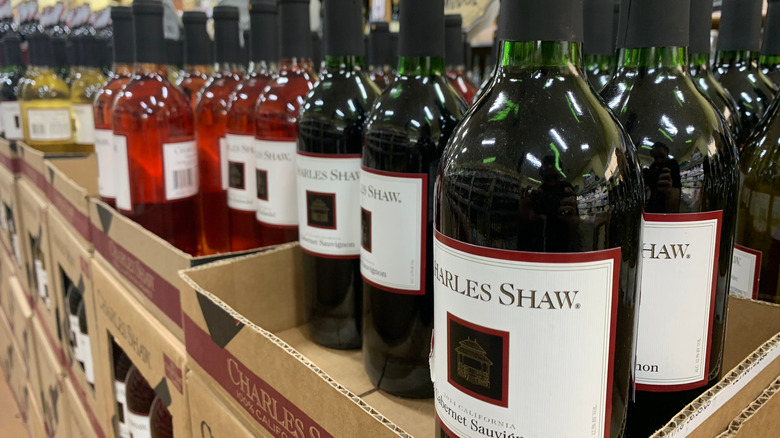The Difference Between Cheap Wines And Value Wines
The world of wine, as adventurous, enjoyable, and rewarding as it can be, is a confusing and complex territory to navigate (per Vox). Walk into a liquor store or your local boutique wine shop and you've got seemingly endless options of varietals, regions, and price points. How do you choose a wine you know you'll be happy with? What should you look for and what should you stay away from? Where's that sweet spot of wine you'll actually like, that you can actually afford?
Most wine shoppers tend to follow the unwritten rule that the more expensive the bottle, the higher the quality of wine it holds. But this isn't always necessarily the case. Expensive doesn't automatically mean great wine, and affordable doesn't automatically mean sub-par quality (via Insider). There's a difference between cheap wine — think those $4, $5, and $6 bottles on the bottom shelf at your grocery store — and value wine — those affordably priced bottles, maybe in the $10 to $25 range, that are rated highly and over-deliver based on their price point.
The good news is that you don't have to break the bank to find a truly decent wine you can enjoy at home, maybe even one that can contend with those fancy $80 or $100 bottles from Napa or Burgundy. Critically praised value wine is out there — you just have to know how to find it.
What makes cheap wine cheap?
When we say cheap wine, we mean cheap. That $4 bottle might seem like a steal, but it's usually not a risk worth taking. There's a reason those wines run only a few bucks. As sommelier Cara Patricia of DECANTsf tells CNET, "If [the price] seems too good to be true, it is."
So why are some wines so cheap? The price of wine comes down to several main factors, including things like vineyard location, barrel material and aging length, harvesting process, and a region's reputation (per Vincarta). Cheap wines tend to be mass-produced, which can essentially dull the flavors and complexity of the grapes, and often include additives to try to make up for the lack of quality. They are also aged for less time, making production costs cheaper, and are usually machine-harvested which doesn't offer as much quality control as hand-picking.
Cheap wine is cheap wine — and chances are you'll know it with the first sip. That glorified grape juice isn't going to taste great and it's most likely not going to make you feel great, either. But if you stay away from the cheap, mass-produced wines (saving yourself a literal headache rather than a few dollars), there are plenty of options in the still-affordable price range below $25 that don't sacrifice quality and give you a lot of bang for your buck. So how do you find them?
How to find value wines
A great place to start is to familiarize yourself with a few wine regions or grape varieties that might be overlooked or undervalued. Don't go right for the stuff on the shelf you recognize like Napa Cabs or Burgundy Pinots; while those are generally known for being great wines, their prices are also hiked up due to their popularity. CNET gives a helpful tip to "look for regions that are just outside the famous regions." With minimal research, you can find a handful of regions that are cheaper and might have wines similar to the taste profiles you prefer.
Wine Folly gives a few suggestions: try Sicily, Italy, or Columbia Valley, Washington for big, bold reds; Mendocino, California, or Patagonia, Argentina for mineral-forward wines like Chardonnay and Pinot Noir; when it comes to grapes, remember that lesser-known varieties can deliver amazing results at a fraction of the price, simply because they're not as popular. For example, Monastrell is Spain's cheaper, just-as-tasty version of France's Mourvèdre, and Vermentino is a great affordable alternative to Sauvignon Blanc. If you want to look for some specific bottles, Wine Enthusiast offers a great resource of wines $15 and under.
When in doubt, ask the experts. Find the people that know and love wine, and ask them to recommend bottles within a specific price range. Avoid large retail chains or grocery stores; chances are you'll find more knowledge and expertise at small local or boutique wine shops. Happy hunting!


